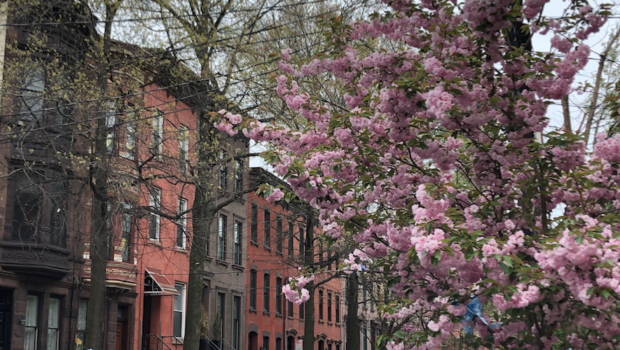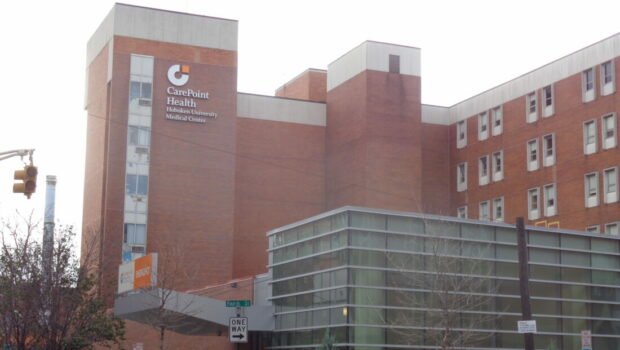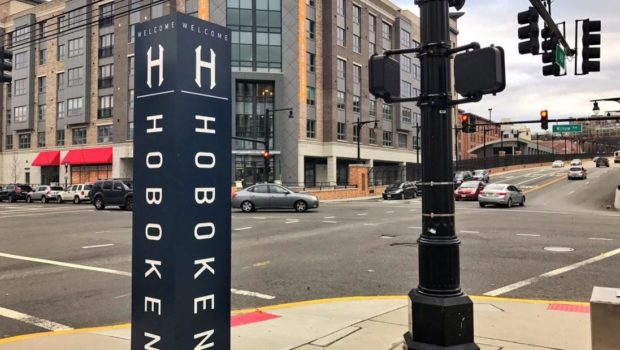
THE QUIET HOUR: A Remembrance of 2020
by Elizabeth Lash
It’s that quiet hour, between day and night. Dusk is almost over. Motorcycles and muscle cars zoom up our streets. I watch the park outside my window begin to empty, as children and their parents drift off for dinner.
I returned from my walk on the river, skyscrapers across the way hazy in the afternoon sun, to find my hallway floor covered with brown paper, and moving blankets piled up in giant blue bins. I saw two workers down the hall in front of my neighbor’s door. There was the sound of hammering.
I knew my neighbors were moving, but I had no idea that day would come so soon. Although we weren’t close, they were good neighbors: we had exchanged contractor recommendations; I had given them baby gifts; they had brought me groceries after my surgery. I was sad to see them go, but, as her husband reminded me when we exchanged good-byes: we go where, and when, the job takes us.
It’s been a year of change, and of transitions. We do ordinarily go where our work takes us, though it wasn’t necessarily so this past year. Right now, people are nostalgic for the past, remembering the last time that life was normal, before the shutdown began.
In some ways, things still remained the same: we had to buy groceries, do our work, look after children. Except that we didn’t, or couldn’t leave our city, or even some of us, our apartments. We were separated from our friends and colleagues in our neighboring state by a river; no one wanted to be exposed by taking the PATH or the bus, or, once in Manhattan, taking the subway to another borough.
Last March, I was already home, having come down sick early on. My ex, with whom I shared an apartment, was still working in the city, although that would soon change. By the time the shutdown officially began, I had recovered, and I was restless, forced to walk the same streets over again, circling our small city’s mile square.
But as I wandered the streets each day, I began to really know what it was like for flowers to bloom. Slowly, carefully, they unfurled their tendrils. I passed tulips in violet, orange, pink, behind brownstones’ wrought iron fences; watched the flowering pear trees blossom, and then fall, covering the streets below with white petals. I lingered in a neighborhood church’s garden to smell its fragrant mix, observing how its scents changed as the days lengthened. I wasn’t the only one to notice: someone began a Facebook group about all of the flowers blooming in Hoboken.
Had I not been forced to only wander our city’s streets each day, respite taken between emails and conference calls, I doubt I would have noticed—or just quickly, in passing, as I usually do, on my commute to a windowless office. It turned out I was grateful for the chance.
Those who move to places with only one season often miss seeing the change in seasons. Maybe it’s because they miss the anticipation that these changes often seem to herald, that of the potential for transformation.
It’s been a year of change: in presidents, in attitudes, in habits. On a personal level, despite it all, I bought a home; had surgery; changed jobs, if only remotely. Last year, we saw friends, colleagues, strangers fall to the virus; this year, we’ve seen them be vaccinated. And that dusky hour, once filled with car horns and clapping, has returned to quiet.
This year’s spring brings with it, along with warm March days, a more weighty hope for transformation: that of a return to ordinary society, and to more ordinary cares: not only in our city, and our country, but in the world at large.
Let’s hope that this spring fulfills that heralded promise and that this year, as my neighbor remarked, we can go where the job takes us.

***
 Elizabeth Lash is a lawyer based in Hoboken, New Jersey. She runs the podcast, “Entering the Bar, with Liz Lash,” and her writing has been published by the Peekskill Herald, The 5-2: Crime Poetry Weekly, Data Guidance, the Center for Art Law, the Holy Cross Journal of Law and Public Policy, Transparency International, the Engineering News-Record, and GetCrafty.com, among others.
Elizabeth Lash is a lawyer based in Hoboken, New Jersey. She runs the podcast, “Entering the Bar, with Liz Lash,” and her writing has been published by the Peekskill Herald, The 5-2: Crime Poetry Weekly, Data Guidance, the Center for Art Law, the Holy Cross Journal of Law and Public Policy, Transparency International, the Engineering News-Record, and GetCrafty.com, among others.

 Previous Article
Previous Article Next Article
Next Article WORK IT OUT WEDNESDAY (Football Edition): Sunday Funday Made Healthy?
WORK IT OUT WEDNESDAY (Football Edition): Sunday Funday Made Healthy?  HPD Release 2019 Hoboken SantaCon Naughty List; John Oliver Thinks They’re “The Saddest”
HPD Release 2019 Hoboken SantaCon Naughty List; John Oliver Thinks They’re “The Saddest”  DeFusco Announces Campaign Manager Amid Fallout From Raia VBM Trial
DeFusco Announces Campaign Manager Amid Fallout From Raia VBM Trial  WHAT’S UP, DOC?: RWJBarnabas Health to Buy Hoboken University Medical Center & Christ Hospital from CarePoint
WHAT’S UP, DOC?: RWJBarnabas Health to Buy Hoboken University Medical Center & Christ Hospital from CarePoint  hOMES: Your Weekly Insight into Hoboken Real Estate Trends | JUNE 3-9, 2016
hOMES: Your Weekly Insight into Hoboken Real Estate Trends | JUNE 3-9, 2016  OH, THE HUMANITY… – Proposed Wage Hike May Force New Jersey Residents to Pump Our Own Gas
OH, THE HUMANITY… – Proposed Wage Hike May Force New Jersey Residents to Pump Our Own Gas  Schools Closed, State of Emergency Enacted Over That Thing We’re No Longer Going to Talk About
Schools Closed, State of Emergency Enacted Over That Thing We’re No Longer Going to Talk About  HELLO HARLOW: New Luxury Apartment Building to Serve as Home to Hoboken Trader Joe’s
HELLO HARLOW: New Luxury Apartment Building to Serve as Home to Hoboken Trader Joe’s